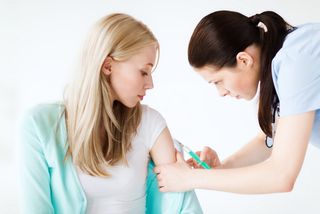Do I Have to Get Hpv Vaccine Again
Women Who Received HPV Vaccine May Demand Another Shot

PHILADELPHIA — Women who receive the human papillomavirus (HPV) vaccine may exist more than likely to be infected with certain high-chance strains of the virus than women who do not go the vaccine, according to a new study.
The findings suggest that, although the vaccine is effective in protecting against four strains of HPV, women who received information technology may still benefit from getting another, recently approved HPV vaccine that protects against nine strains of the virus, the researchers said.
"Vaccinated women who got the quadrivalent [iv-strain] vaccine may get the nine-valent [strain] vaccine as further protection for them," said Fangjian Guo, a postdoctoral fellow at the Academy of Texas Medical Branch and one of the researchers on the new study. Guo noted that this is not an official recommendation, and that more enquiry is needed to confirm the findings. Currently, the Centers for Disease Control and Prevention recommends that girls and young women ages 9 to 26 go any HPV vaccine to protect against cervical cancer, every bit some strains of HPV have been linked to cervical cancer.
The new study was presented this calendar week here at the meeting of the American Association for Cancer Research. It has not however been published in a peer-reviewed journal.
For the new study, Guo and his colleagues analyzed data from nearly 600 women ages twenty to 26, including lxxx women who had received the original Gardasil HPV vaccine, which protects against four HPV types — six, 11, 16 and 18. There are many types of HPV, and some can lead to cervical cancer if the body does non clear the infection after many years. HPV types sixteen and 18 cause the majority of cervical cancers.
Women in the study who received the Gardasil vaccine were, indeed, less probable to be infected with the iv strains of the virus included the vaccine: Almost xi pct of vaccinated women were infected with HPV half-dozen, eleven, 16 or 18, compared with nearly twenty percent of unvaccinated women.
However, the women who received the vaccine were more likely to be infected with other loftier-risk HPV strains not included in the vaccine. About 61 per centum of the women who received the vaccine were infected with another type of loftier-take a chance HPV, compared with forty percent of women who did not receive the vaccine. (HPV strains are considered "high gamble" if they tin cause cellular changes that tin can eventually lead to cancer.)
After the researchers took into account factors that could affect a person'south gamble of HPV infection (including his or her number of sexual partners), the women who received the original HPV vaccine withal had about a 40 per centum greater risk of being infected with a high-take a chance HPV strain non included in the vaccine. [10 Do'due south and Don'ts to Reduce Your Risk of Cancer]
It'southward unclear why the vaccinated women were more likely to be infected with other high-risk strains, the researchers said.
The new findings propose that women previously vaccinated against HPV may benefit from a new HPV vaccine, chosen Gardasil ix, which protects against the original four strains plus five more strains (31, 33, 45, 52 and 58) of HPV that cause almost 20 percent of cervical cancers, the researchers said. Gardasil 9 was approved in Dec 2014 for women ages 9 to 26.
And if a woman is already infected with HPV, the HPV vaccine cannot eliminate this infection, Guo noted. Younger women and girls who have not acquired an HPV infection would do good most from the new vaccine, Guo said.
Because the new study looked at women at one point in fourth dimension, the researchers could not determine women's risk of going on to develop cervical cancer. Notwithstanding previous studies have found that the HPV vaccine lowers the rate of precancerous lesions in women who are vaccinated.
Studies that follow women over time would be needed in order to make up one's mind women's risk of developing cervical cancer if they were vaccinated but were to even so become infected with a high-risk strain of HPV, Guo said.
The new written report "highlights the need to go on to pursue additional strategies to command HPV infection," said Dr. Kunle Odunsi, deputy manager and chairman of the department of gynecologic oncology at Roswell Park Cancer Institute in Buffalo, New York, who was non involved in the written report.
"We demand to recall that there are more than 80 HPV types, and some of them tin still be associated with take a chance of cervical malignant illness," Odunsi said.
Future vaccines could include even more than strains of the virus, Odunsi said.
Based on the new findings, Odunsi said that, in his opinion, women who received the quadrivalent vaccine should probably get the nine-valent vaccine.
Dr. Shashikant Lele, clinical chief of gynecologic oncology, too of Roswell Park, said he would similar to run across the new findings replicated, considering it's non articulate why women who were vaccinated with the quadrivalent vaccine would be more prone to other HPV infections than women who had not received the vaccine. "That doesn't brand sense to me," Lele said.
In add-on, it's non articulate whether women who received the quadrivalent vaccine would do good from the nine-valent vaccine, and then studies need to be conducted to exam this hypothesis, Lele said.
Follow Rachael Rettner @RachaelRettner. Follow Live Science @livescience , Facebook & Google+ . Original article on Alive Science .
Source: https://www.livescience.com/50563-hpv-vaccine-infections-prevalence.html
